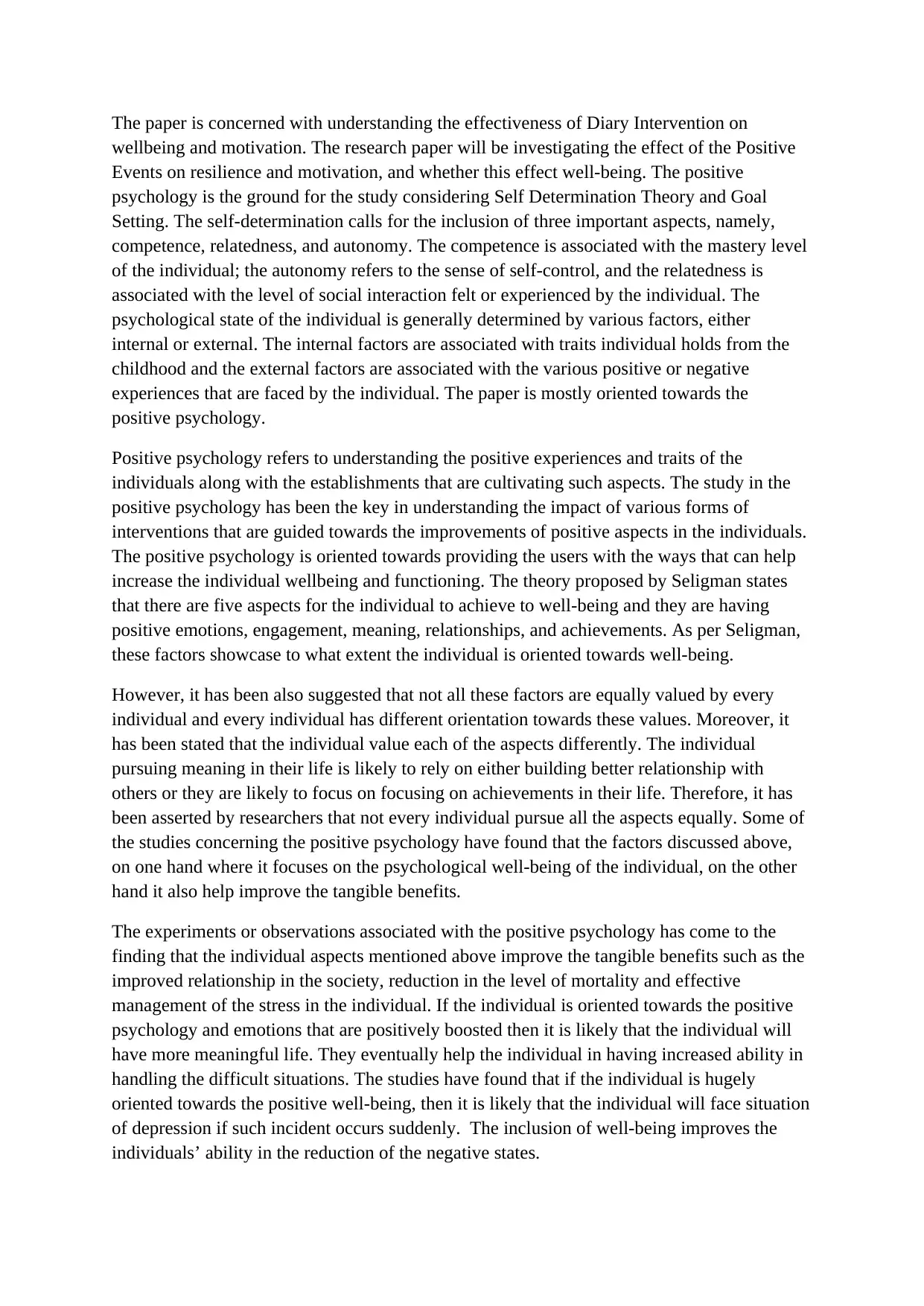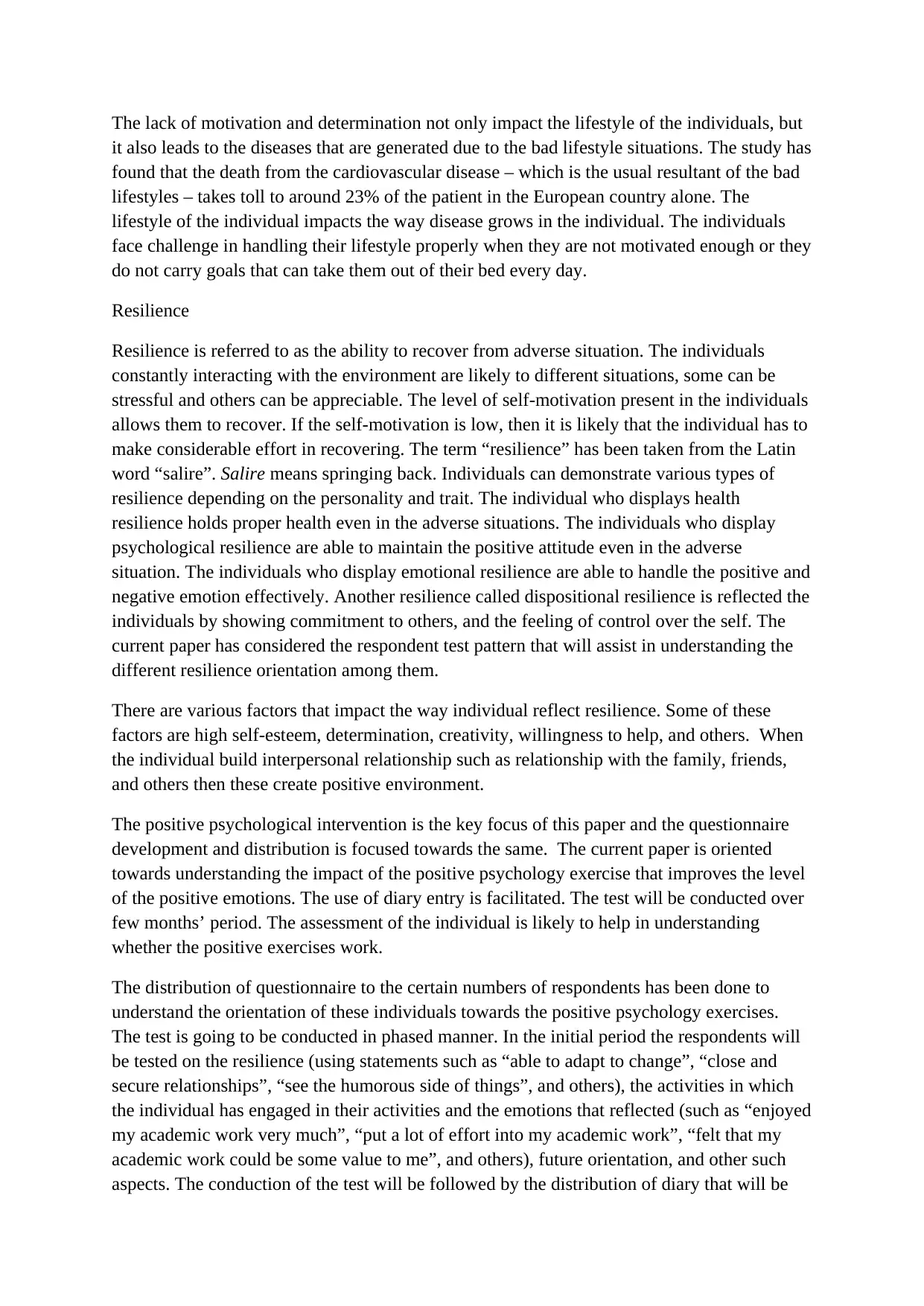The Impact of Diary Intervention on Wellbeing and Motivation
VerifiedAdded on 2019/09/19
|3
|1251
|410
Report
AI Summary
This assignment is concerned with understanding the effectiveness of Diary Intervention on wellbeing and motivation, using Positive Psychology and Self-Determination Theory as the foundation. The study investigates the impact of positive events on resilience and motivation, and whether this effect influences well-being. It also explores how positive psychology exercises can improve individuals' levels of positive emotions, motivation, and resilience.
Contribute Materials
Your contribution can guide someone’s learning journey. Share your
documents today.

The paper is concerned with understanding the effectiveness of Diary Intervention on
wellbeing and motivation. The research paper will be investigating the effect of the Positive
Events on resilience and motivation, and whether this effect well-being. The positive
psychology is the ground for the study considering Self Determination Theory and Goal
Setting. The self-determination calls for the inclusion of three important aspects, namely,
competence, relatedness, and autonomy. The competence is associated with the mastery level
of the individual; the autonomy refers to the sense of self-control, and the relatedness is
associated with the level of social interaction felt or experienced by the individual. The
psychological state of the individual is generally determined by various factors, either
internal or external. The internal factors are associated with traits individual holds from the
childhood and the external factors are associated with the various positive or negative
experiences that are faced by the individual. The paper is mostly oriented towards the
positive psychology.
Positive psychology refers to understanding the positive experiences and traits of the
individuals along with the establishments that are cultivating such aspects. The study in the
positive psychology has been the key in understanding the impact of various forms of
interventions that are guided towards the improvements of positive aspects in the individuals.
The positive psychology is oriented towards providing the users with the ways that can help
increase the individual wellbeing and functioning. The theory proposed by Seligman states
that there are five aspects for the individual to achieve to well-being and they are having
positive emotions, engagement, meaning, relationships, and achievements. As per Seligman,
these factors showcase to what extent the individual is oriented towards well-being.
However, it has been also suggested that not all these factors are equally valued by every
individual and every individual has different orientation towards these values. Moreover, it
has been stated that the individual value each of the aspects differently. The individual
pursuing meaning in their life is likely to rely on either building better relationship with
others or they are likely to focus on focusing on achievements in their life. Therefore, it has
been asserted by researchers that not every individual pursue all the aspects equally. Some of
the studies concerning the positive psychology have found that the factors discussed above,
on one hand where it focuses on the psychological well-being of the individual, on the other
hand it also help improve the tangible benefits.
The experiments or observations associated with the positive psychology has come to the
finding that the individual aspects mentioned above improve the tangible benefits such as the
improved relationship in the society, reduction in the level of mortality and effective
management of the stress in the individual. If the individual is oriented towards the positive
psychology and emotions that are positively boosted then it is likely that the individual will
have more meaningful life. They eventually help the individual in having increased ability in
handling the difficult situations. The studies have found that if the individual is hugely
oriented towards the positive well-being, then it is likely that the individual will face situation
of depression if such incident occurs suddenly. The inclusion of well-being improves the
individuals’ ability in the reduction of the negative states.
wellbeing and motivation. The research paper will be investigating the effect of the Positive
Events on resilience and motivation, and whether this effect well-being. The positive
psychology is the ground for the study considering Self Determination Theory and Goal
Setting. The self-determination calls for the inclusion of three important aspects, namely,
competence, relatedness, and autonomy. The competence is associated with the mastery level
of the individual; the autonomy refers to the sense of self-control, and the relatedness is
associated with the level of social interaction felt or experienced by the individual. The
psychological state of the individual is generally determined by various factors, either
internal or external. The internal factors are associated with traits individual holds from the
childhood and the external factors are associated with the various positive or negative
experiences that are faced by the individual. The paper is mostly oriented towards the
positive psychology.
Positive psychology refers to understanding the positive experiences and traits of the
individuals along with the establishments that are cultivating such aspects. The study in the
positive psychology has been the key in understanding the impact of various forms of
interventions that are guided towards the improvements of positive aspects in the individuals.
The positive psychology is oriented towards providing the users with the ways that can help
increase the individual wellbeing and functioning. The theory proposed by Seligman states
that there are five aspects for the individual to achieve to well-being and they are having
positive emotions, engagement, meaning, relationships, and achievements. As per Seligman,
these factors showcase to what extent the individual is oriented towards well-being.
However, it has been also suggested that not all these factors are equally valued by every
individual and every individual has different orientation towards these values. Moreover, it
has been stated that the individual value each of the aspects differently. The individual
pursuing meaning in their life is likely to rely on either building better relationship with
others or they are likely to focus on focusing on achievements in their life. Therefore, it has
been asserted by researchers that not every individual pursue all the aspects equally. Some of
the studies concerning the positive psychology have found that the factors discussed above,
on one hand where it focuses on the psychological well-being of the individual, on the other
hand it also help improve the tangible benefits.
The experiments or observations associated with the positive psychology has come to the
finding that the individual aspects mentioned above improve the tangible benefits such as the
improved relationship in the society, reduction in the level of mortality and effective
management of the stress in the individual. If the individual is oriented towards the positive
psychology and emotions that are positively boosted then it is likely that the individual will
have more meaningful life. They eventually help the individual in having increased ability in
handling the difficult situations. The studies have found that if the individual is hugely
oriented towards the positive well-being, then it is likely that the individual will face situation
of depression if such incident occurs suddenly. The inclusion of well-being improves the
individuals’ ability in the reduction of the negative states.
Secure Best Marks with AI Grader
Need help grading? Try our AI Grader for instant feedback on your assignments.

The lack of motivation and determination not only impact the lifestyle of the individuals, but
it also leads to the diseases that are generated due to the bad lifestyle situations. The study has
found that the death from the cardiovascular disease – which is the usual resultant of the bad
lifestyles – takes toll to around 23% of the patient in the European country alone. The
lifestyle of the individual impacts the way disease grows in the individual. The individuals
face challenge in handling their lifestyle properly when they are not motivated enough or they
do not carry goals that can take them out of their bed every day.
Resilience
Resilience is referred to as the ability to recover from adverse situation. The individuals
constantly interacting with the environment are likely to different situations, some can be
stressful and others can be appreciable. The level of self-motivation present in the individuals
allows them to recover. If the self-motivation is low, then it is likely that the individual has to
make considerable effort in recovering. The term “resilience” has been taken from the Latin
word “salire”. Salire means springing back. Individuals can demonstrate various types of
resilience depending on the personality and trait. The individual who displays health
resilience holds proper health even in the adverse situations. The individuals who display
psychological resilience are able to maintain the positive attitude even in the adverse
situation. The individuals who display emotional resilience are able to handle the positive and
negative emotion effectively. Another resilience called dispositional resilience is reflected the
individuals by showing commitment to others, and the feeling of control over the self. The
current paper has considered the respondent test pattern that will assist in understanding the
different resilience orientation among them.
There are various factors that impact the way individual reflect resilience. Some of these
factors are high self-esteem, determination, creativity, willingness to help, and others. When
the individual build interpersonal relationship such as relationship with the family, friends,
and others then these create positive environment.
The positive psychological intervention is the key focus of this paper and the questionnaire
development and distribution is focused towards the same. The current paper is oriented
towards understanding the impact of the positive psychology exercise that improves the level
of the positive emotions. The use of diary entry is facilitated. The test will be conducted over
few months’ period. The assessment of the individual is likely to help in understanding
whether the positive exercises work.
The distribution of questionnaire to the certain numbers of respondents has been done to
understand the orientation of these individuals towards the positive psychology exercises.
The test is going to be conducted in phased manner. In the initial period the respondents will
be tested on the resilience (using statements such as “able to adapt to change”, “close and
secure relationships”, “see the humorous side of things”, and others), the activities in which
the individual has engaged in their activities and the emotions that reflected (such as “enjoyed
my academic work very much”, “put a lot of effort into my academic work”, “felt that my
academic work could be some value to me”, and others), future orientation, and other such
aspects. The conduction of the test will be followed by the distribution of diary that will be
it also leads to the diseases that are generated due to the bad lifestyle situations. The study has
found that the death from the cardiovascular disease – which is the usual resultant of the bad
lifestyles – takes toll to around 23% of the patient in the European country alone. The
lifestyle of the individual impacts the way disease grows in the individual. The individuals
face challenge in handling their lifestyle properly when they are not motivated enough or they
do not carry goals that can take them out of their bed every day.
Resilience
Resilience is referred to as the ability to recover from adverse situation. The individuals
constantly interacting with the environment are likely to different situations, some can be
stressful and others can be appreciable. The level of self-motivation present in the individuals
allows them to recover. If the self-motivation is low, then it is likely that the individual has to
make considerable effort in recovering. The term “resilience” has been taken from the Latin
word “salire”. Salire means springing back. Individuals can demonstrate various types of
resilience depending on the personality and trait. The individual who displays health
resilience holds proper health even in the adverse situations. The individuals who display
psychological resilience are able to maintain the positive attitude even in the adverse
situation. The individuals who display emotional resilience are able to handle the positive and
negative emotion effectively. Another resilience called dispositional resilience is reflected the
individuals by showing commitment to others, and the feeling of control over the self. The
current paper has considered the respondent test pattern that will assist in understanding the
different resilience orientation among them.
There are various factors that impact the way individual reflect resilience. Some of these
factors are high self-esteem, determination, creativity, willingness to help, and others. When
the individual build interpersonal relationship such as relationship with the family, friends,
and others then these create positive environment.
The positive psychological intervention is the key focus of this paper and the questionnaire
development and distribution is focused towards the same. The current paper is oriented
towards understanding the impact of the positive psychology exercise that improves the level
of the positive emotions. The use of diary entry is facilitated. The test will be conducted over
few months’ period. The assessment of the individual is likely to help in understanding
whether the positive exercises work.
The distribution of questionnaire to the certain numbers of respondents has been done to
understand the orientation of these individuals towards the positive psychology exercises.
The test is going to be conducted in phased manner. In the initial period the respondents will
be tested on the resilience (using statements such as “able to adapt to change”, “close and
secure relationships”, “see the humorous side of things”, and others), the activities in which
the individual has engaged in their activities and the emotions that reflected (such as “enjoyed
my academic work very much”, “put a lot of effort into my academic work”, “felt that my
academic work could be some value to me”, and others), future orientation, and other such
aspects. The conduction of the test will be followed by the distribution of diary that will be

filled by the respondents for five days. The set of questionnaire test will be conducted after
the one week time and the response will be assessed. The same test will be repeated after two
to three months’ time period to understand whether the effect of the exercise persisted.
the one week time and the response will be assessed. The same test will be repeated after two
to three months’ time period to understand whether the effect of the exercise persisted.
1 out of 3
Related Documents
Your All-in-One AI-Powered Toolkit for Academic Success.
+13062052269
info@desklib.com
Available 24*7 on WhatsApp / Email
![[object Object]](/_next/static/media/star-bottom.7253800d.svg)
Unlock your academic potential
© 2024 | Zucol Services PVT LTD | All rights reserved.





